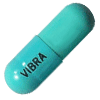MAIN INFORMATION

- Name: Vibramycin
- Brand Name: Monodox / Microdox / Periostat / Vibra-Tabs /Oracea / Doryx / Vibrox / Adoxa / Doxyhexal / Doxylin / Doxy
- Active ingredient: Doxycycline Hyclate
- Used for: Bacterial Infection Treatment
- Dosages (mg): 100/150/200
- Drug Class: Antibiotics
CONTENT
- Indications and Usage
- Treatment
- How to Use
- Safety Information
- Storage
- Side Effects
- Dosage and Overdose
- Warnings
Vibramycin (Doxycycline Hyclate) Indications and Usage
This tetracycline antibiotic is prescribed to treat bacterial infections, acne or ameba infections, or to prevent malaria or anthrax. This medication slows down or stops the bacteria’s growth and enables the immune system to fight and eventually destroy bacteria. It is effective only for treating bacterial infections and does not treat viral infections such as flu, cold, running nose, etc.
Treatment
Vibramycin is indicated to treat the following conditions:
- Rocky Mountain spotted fever, rickettsialpox, and typhus fever
- Respiratory tract infections
- Lymphogranuloma venereum
- Trachoma
- Psittacosis
- Inclusion conjunctivitis
- Uncomplicated urethral infection
- Endocervical infection
- Nongonococcal urethritis
- Relapsing fever
- Chancroid
- Tularemia
- Campylobacter fetus infections
- Upper respiratory infections
- Uncomplicated gonorrhea
- Yaws
- Syphilis
- Listeriosis
- Severe acne
- Vincent’s infection
Vibramycin treatment can be prescribed only by your doctor based on an examination and after the necessary tests done. There are certain medical conditions that may interact with Vibramycin, and influence the dosage or eliminate intake.
Report your doctor on any of the following:
- You are expecting a child, planning to get pregnant, or are currently breast-feeding.
- You are currently taking any medicine or undergo any treatment.
- You have allergy to any components and ingredients.
- You have porphyria or diarrhea.
Every package of Vibramycin is supplied with a dosing instruction inside. However, you should follow the plan as prescribed by your doctor. Vibramycin is designed for oral administration and is normally taken by mouth without food. If the intake on the empty stomach provokes discomfort, take it with food to avoid irritation.

How to Use
Vibramycin is taken with plenty of fluids, mostly water, one or two times per day 1 hour before or 2 hours after a meal, unless instructed otherwise by your care provider. For ten minutes after administration, do not lie down or make active moves. Make sure you take this medication 2 to 3 hours after or before taking the antacid containing aluminum, iron, magnesium, zinc, calcium, or bismuth subsalicylate. Products with these elements may block your body from absorbing doxycycline in the proper way.
To prevent malaria while travelling to the infected area, Vibramycin is taken once per day. Start the intake 1 to 2 days before going to the infected region and continue to take it daily while in the territory. After your return home, you should keep on taking this medication up to 4 more weeks, unless prescribed otherwise by your doctor. However, note that Vibramycin does not guarantee protection against malaria in case of a mosquito bite. Take all the necessary precautions, and use mosquito nets and insect repellent to avoid infection.
If you take Vibramycin in a liquid form, shake the bottle before each dose. Make sure you use a special measuring spoon to measure the dose, because a household spoon may give you a slightly incorrect dosage.
Like any other antibiotics, Vibramycin shows effect when taken at evenly spaced intervals to keep the amount of medicine in your body at a fixed level.
To fully get rid of the infection, take Vibramycin during the scheduled course of treatment till the full prescribed plan is completed. Continue taking it even if symptoms disappear in a few days and you feel better. If you interrupt the treatment too early, bacteria may continue to grow, increasing the chance of an infection recurrence. Moreover, it could become less responsive to this or other treatment with this kind of medicine, making the infection more difficult to manage in the future.
Safety Information
Do not use Vibramycin in case you are allergic to any of its components, or are undergoing treatment presupposing intake of isotretinoin, acitretin, or penicillin. If you are scheduled to receive or have recently received an oral typhoid vaccine, avoid taking Vibramycin as well. There are medicines that may interact with Vibramycin and influence the dosage or schedule of intake.
Inform your doctor if you are currently taking:
- Barbiturates, hydantoins, carbamazepine, or urinary alkalinizers
- Acitretin, digoxin anticoagulants, methotrexate, or methoxyflurane
- Live oral typhoid vaccine, birth control pills, or amoxicillin
Women using Vibramycin should note that this medicine may interact with birth control pills, which may work less effectively. To prevent pregnancy, use condoms or additional forms of birth control.
Patients who take Vibramycin get sunburned faster and more easily. If it is the first time you take this medicine and you do not know how your body reacts to it, avoid being in the sun for too long, and use a sunscreen or protective clothing to cover your body. Avoid sunlamps and tanning booths as well.
Antibiotic use often causes mild diarrhea. However, if you have symptoms of more severe form of diarrhea, stomach cramps, or blood stools, visit your doctor immediately. Do not self-medicate without checking with your care provider.
If you are planning to receive any dental care or surgery during the Vibramycin course of treatment, give your doctor or dentist the necessary information on your medicine plan.
Children under age of 8, pregnant women and breast-feeding mothers should avoid taking Vibramycin.
Storage
Store Vibramycin at room temperature, and keep it away from sunlight, heat, moisture and cold. Keep Vibramycin away from children and pets. Note that different brands may have different storage requirements, and carefully check the label for proper instructions. Do not use the medicine past its expiry date, or if it has been stored in the inappropriate condition.
Side Effects
Like any other medicine, Vibramycin may cause side effects as a result of the improper usage, wrong dosage, mistreatment and many other factors.
The common minor side effects of Vibramycin include:
- Upset stomach
- General body swelling
- Loss of appetite
- Diarrhea
- Cracks in the skin
- Nausea
- Red, swollen skin
- Vomiting
- Sensitivity to sunlight
Contact your doctor immediately in case you experience any of these serious effects:
- Severe allergic reaction (rash, itching, labored breathing, swelling of face)
- Blood in stool
- Chest pain
- Urine color change
- Too frequent urination
- Fever
- Painful/difficult swallowing
- Severe sunburn
- Swollen or peeling skin
- Bloating
- Severe diarrhea
- Persistent headache
- Stomach cramps
- Throat irritation
- Unusual bruising or bleeding
- Joint pain
- Vaginal irritation
- Oral thrush
- Vision change
- Permanent vision loss
- Yellow skin or eyes
The possible side effects of Vibramycin are not limited to this list. If you develop other symptoms than listed above, immediately contact your care provider.
Dosage and Overdose
For adults, your doctor determines the necessary dosage considering your medical condition, response to treatment, complications, if any, and other relevant information. When it comes to treating children, weight may be taken in consideration as well when prescribing the dosage.
Adults
Unless otherwise is directed by your doctor, the usual dose of Vibramycin for adults is 200 mg taken by mouth on the first day of treatment. It is administered two times – 100 mg every 12 hours. The following dosage is 100 mg per day till the treatment course is finished. For treating more severe infections, the dose of 100 mg taken every 12 hours may be prescribed.
Children
For pediatric patients with weight less than 45 kg, suffering from life-threatening infections, for example, Rocky Mountain spotted fever, the advised dose is 2.2 mg/kg of body weight taken every 12 hours. When managing less severe disease, the recommended dosage is 4.4 mg/kg of body weight taken two times on the first day of treatment. Further, 2.2 mg/kg of body weight should be taken as a daily dose. Children weighing ≥ 45 kg receive the adult dose.
The continuation of treatment depends on your particular case, the way your body responds to medicine, side effects, if any, and other factors, and only your doctor can prescribe you with a treatment plan. However, uncomplicated gonococcal, endocervical, urethral, or rectal infections, and nongonococcal urethritis are normally treated with 100 mg taken twice a day for a week. Syphilis detected on the early stage and after a year is treated with 100 mg taken twice a day for 2 weeks, or with 100 mg taken twice a day for a month, correspondingly.
The effectiveness of your treatment depends on regular administration, and if you forget to take a dose of Vibramycin, take it right after you remember. But if it is almost the time to take the next dose, skip the missed one and resume your regular dosing plan. Do not try to catch up with the schedule and take 2 doses at once.
Warnings
Avoid the use of Vibramycin in pregnant women, and breast-feeding mothers, as animal studies suggest tetracycline may penetrate the placenta and fetal tissues, and cause toxic effects on a fetus.
An antibacterial medicine, Vibramycin may cause overgrowth of non-susceptible organisms, fungi in particular. If any symptom of superinfection develops, stop taking Vibramycin and consult your doctor regarding the appropriate therapy.
All patients taking Vibramycin are recommended to avoid exposure to the sun, drink enough water when administering the medicine, and strictly stick to the prescribed treatment schedule. Intentional skipping of doses or early interruption of the therapy may negatively affect the effectiveness and promote bacteria to become insensitive to Vibramycin or other antibacterial medicine.







